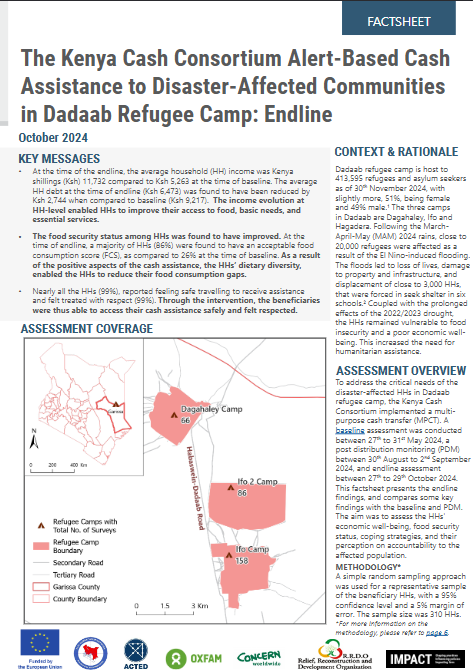ASAL Humanitarian Network (AHN)
ENDLINE FINDINGS SHOW IMPROVED HOUSEHOLD INCOME, FOOD SECURITY, AND SAFETY AMONG REFUGEE COMMUNITIES IN DADAAB CAMP
Endline Insights – Alert-Based Cash Assistance to Disaster-Affected Communities in Dadaab Refugee Camp
The Kenya Cash Consortium’s locally-led multi-purpose cash transfer programme helped households recover from flooding and drought shocks while enhancing resilience and accountability.
The Alert-Based Cash Assistance to Disaster-Affected Communities in Dadaab Refugee Camp project was implemented by the Kenya Cash Consortium to support households affected by the 2024 El Niño-induced floods and prolonged drought conditions. IMPACT Initiatives conducted the endline assessment in October 2024, surveying 310 households across Dagahaley, Ifo 1, and Ifo 2 camps through a simple random sampling approach (95% confidence, 5% margin of error).
Results show strong economic recovery and improved well-being compared to the baseline. Average household income rose from KES 5,263 to KES 11,732, while average debt decreased from KES 9,217 to KES 6,473. Nearly three-quarters of households (74%) could now meet most or about half of their basic needs, compared to just 34% at baseline. Expenditure also increased to KES 10,092, reflecting enhanced access to goods and services despite inflationary pressures.
Food security improved dramatically. Households with an acceptable Food Consumption Score increased from 26% to 86%, and those experiencing little or no hunger rose to 87%. Negative coping strategies such as skipping meals or relying on less-preferred foods declined sharply, while 99% of respondents reported feeling safe and respected during assistance delivery. These findings underscore the positive impact of cash assistance on both economic stability and protection outcomes.
The endline confirms that multi-purpose cash transfers, delivered through mobile money, strengthen refugee household resilience, dignity, and self-reliance. Continued investment in adaptive, locally-led cash systems will be vital for future humanitarian responses in refugee-hosting areas.
📄 Click the image below to download the full Endline Factsheet (PDF) for detailed data tables and indicators.

